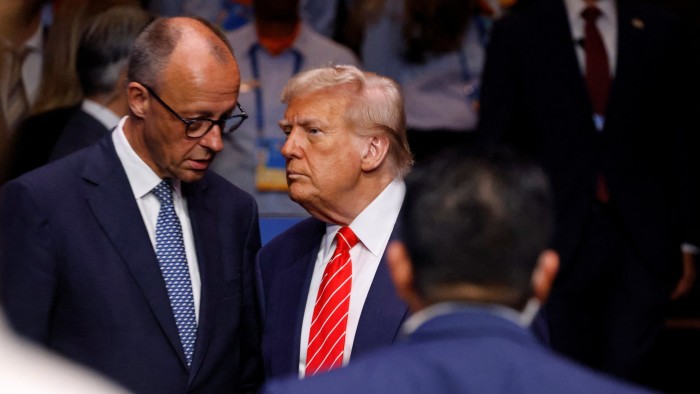Unlock the Editor’s Digest without spending a dime
Roula Khalaf, Editor of the FT, selects her favorite tales on this weekly e-newsletter.
Chancellor Friedrich Merz is “delusional” in his expectation that Germany’s automotive trade can be spared from US tariffs, in line with EU officers concerned in commerce talks with the Trump administration.
Merz has been urgent the European Fee, which manages commerce coverage on behalf of the EU’s 27 member states, to signal a “framework” cope with Washington aping the US-UK settlement signed earlier this month, which included a particular dispensation for automobiles.
However Brussels officers have privately advised Berlin that such an association wouldn’t be potential, as decreasing German automotive imports is a giant focus for US President Donald Trump, two individuals briefed on the discussions advised the Monetary Occasions.
Merz earlier this week criticised the fee for main “too sophisticated” negotiations and stated a deal ought to deal with 4 to 5 key industries, together with automotive, metal and prescribed drugs, the place Trump has already threatened sectoral tariffs.
However fee officers say these are the toughest to take away as a result of Trump needs to reshore these industries within the US and scale back imports.
EU negotiators consider that automobiles are “the toughest factor” of any cope with the White Home and should be dealt with after simpler elements have been agreed first to construct belief, the individuals stated.
Berlin was “delusional” to consider Trump would conform to concessions for German automakers as a primary step, one of many officers stated.
The disconnect between the EU government and the bloc’s largest financial system got here to fore at a leaders’ summit in Brussels on Thursday, the place they had been set to debate the US commerce relationship. Fee officers had been hoping leaders would again a “credible risk” of retaliation to get the deal accomplished by a July deadline.
“I assist the Fee to rapidly come to a commerce cope with the US,” Merz stated as he arrived on the summit.
Trump has threatened 50 per cent “reciprocal” tariffs on EU imports if no deal is struck by July 9.
In the meantime so-called sectoral tariffs of 25 per cent for automobiles and automotive components, and 50 per cent for metal and aluminium, are nonetheless in place — and so is a ten per cent tariff on most different imports.
A number of international locations are cautious of creating too many concessions to get a fast deal. Referring to the UK-US settlement, one senior EU diplomat stated that the bloc “ought to nonetheless hope that the EU with its 450mn individuals would have extra commerce energy than the UK”.
A UK-style carve-out can be sophisticated for the sector if it entails a quota system. Trump agreed to chop a 27.5 per cent tariff on British automobiles to 10 per cent for the primary 100,000 autos shipped from the UK. An analogous deal for the EU would depart member states preventing over the allocation of the quota.
One other senior EU diplomat stated that “the mandate we gave to the fee . . . was to go to the bottom tariffs potential”. They added that “10 per cent shouldn’t be the mandate we gave,” referring to the UK, which accepted the ten per cent levy on most items to stay in place.
If the deal is “not balanced”, the diplomat stated, the EU can be “able to implement” counter tariffs.
The bloc has already agreed however suspended the appliance of retaliatory tariffs on €21bn of US items and is making ready an additional package deal focusing on €95bn value of American merchandise.
Germany’s financial system relies on exports and has been hit significantly laborious by the tariffs. ACEA, the automotive trade physique, stated that carmakers had been shedding “single-digit thousands and thousands” per day in consequence. The German automotive trade accounts for about 5 per cent of the nation’s GDP.
The US is the second-largest marketplace for EU automobile exports after the UK. In 2024, greater than 750,000 automobiles had been exported, valued at €38.9bn. The US exported 169,000 to the EU of €7.8bn worth, in line with ACEA.
Amongst German carmakers, BMW is especially bullish that the US slashes its 25 per cent tariff from July. BMW chief government Oliver Zipse advised traders in mid-Might that the corporate was capable of negotiate with the Trump administration from a place of “energy” as the biggest US automotive exporter by worth final yr, transport 225,000 autos value greater than $10bn, from its plant in Spartanburg.
BMW, Mercedes-Benz and different European carmakers have pushed the US to permit an obligation downside programme, which might assist them get refunds on import tariffs if they’re additionally exporting autos from America.
Senior executives from the highest three German carmakers met Trump on the White Home in mid-April. Merz additionally broached the automotive concern with Trump after they met within the Oval Workplace earlier this month.
“I stated that I drive an American automotive with a German model,” Merz stated after the assembly, by means of explaining to the US president that many German carmakers together with BMW produced autos within the US earlier than exporting them again to Europe.
Whereas Merz has pressed the EU to achieve a cope with the US as quickly as potential, some German carmakers are much less optimistic. “It’s a blended bag in the intervening time,” one automotive official stated. “On the finish of the day, it’s the EU that’s negotiating with the US.”
One other particular person at a German carmaker stated: “Negotiations appear to be a bit caught. It’s irritating . . . that the EU is letting time cross.”

